As to whether the coffee is sweet or not, what kind of sweetness do you mean when you say sweet?
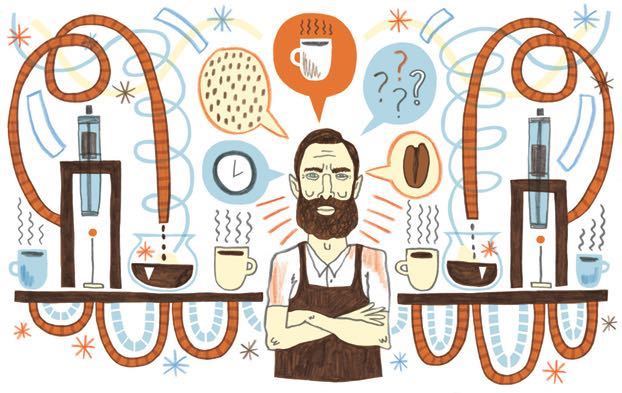
For professional baristas, please follow the coffee workshop (Wechat official account cafe_style)
"Coffee only smells good, it tastes sour and bitter."-I don't drink coffee, Mom.
"Sweet, floral, hazelnut, bright sour taste, distinct layers, chocolate finish."-Coffee player
"the black in front of you is not black. What do you mean by white?"-Xiao Huangqi
Everyone can easily recognize the sour, bitter and aroma of coffee, but the sweetness of coffee seems to be a gap, as if it can be crossed to become an expert. So that when tasting coffee, we should try to feel the sweetness in other people's mouth carefully. I am afraid that my sense of taste is not sensitive enough to live up to the colorful and colorful Huaguo Mountain in my hand. Take incense and worship, over time, it seems to be so determined.
But is that really the case? It is inevitable that we will feel guilty when we laugh at the martial arts masters who beat cows in front of the computer screen, will we also put on the king's new clothes at the same time?
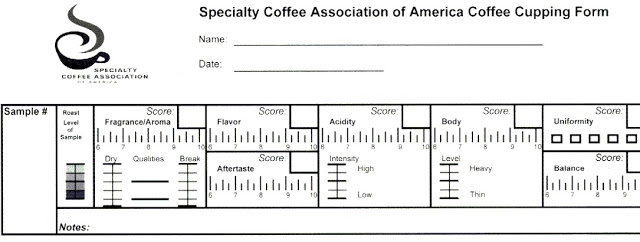
Take a look at the SCAA cup meter, ranging from dry / wet aroma, flavor, finish, to acidity, balance and thickness, with a score of 6 to 10 points, with an interval of 0.25.
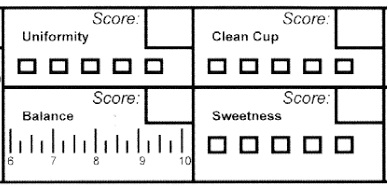
The sweetness score is much simpler, with five squares representing five cups of samples with only 2 points for each cup. Sweetness is so important that every expert can tell how wonderful it is. Why is the cup score relatively rough and understated, with only the difference between 0 and 2?
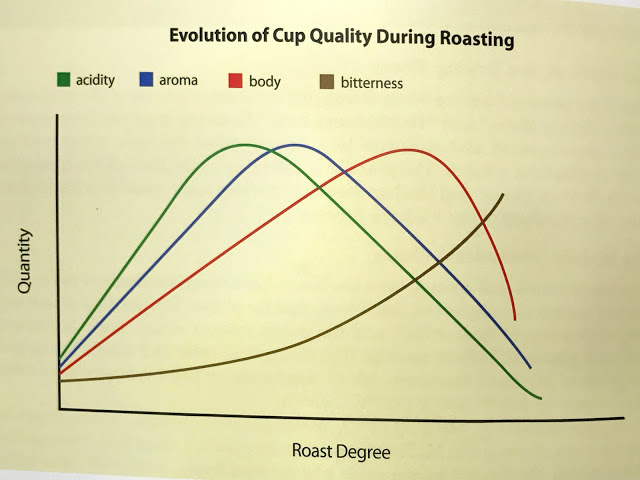
Scott Rao: The Coffee Roaster's Companion
Scott Rao's book provides a map of the development of coffee flavor and roasting degree. The taste part is only sour and bitter, but sweetness is not included. Olfactory aroma (aroma) has a place, and tactile mellow thickness (body) is also included, but there is no sweetness.
The answer, the answer, the answer does not drift away in the wind, in the scientific analysis.
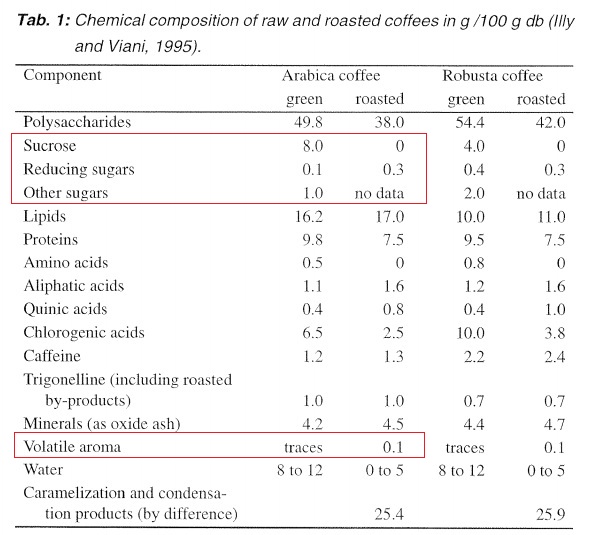
Illy & Viani, 1995
Find data on the composition of coffee from a paper. Carbohydrates can be divided into polysaccharides, disaccharides and monosaccharides. Polysaccharides (polysaccharides), such as cellulose, are not sweet, while sucrose (sucrose) is a disaccharide that breaks down into monosaccharides (glucose and fructose) during baking and participates in the Mena reaction.
As shown above, Arabica raw beans contain 8% sucrose, and by the end of baking, after Mena reaction, Stryker degradation, and caramelization, only 0.3% of reducing sugar is left, very little. If you really want to say that coffee is sweet, you should bite raw beans.
Coffee beans that have been roasted are not sweet in terms of taste.
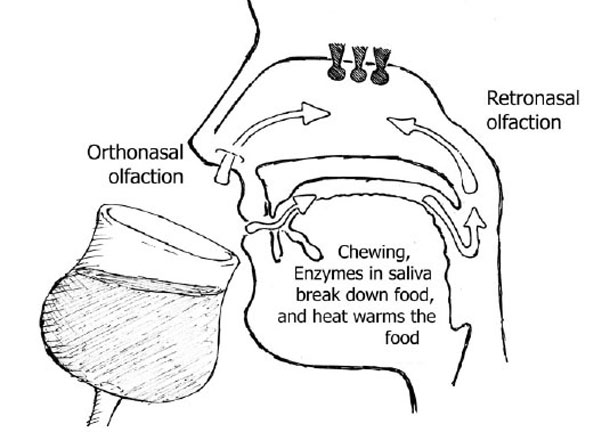
Kevin Liu: Craft Cocktails at Home
Since the sugar content in the beans is so low after baking, where does the sweetness we taste come from? The answer lies in the posterior nasal pathway in the sense of smell. There are two ways to smell. The prenasal pathway (Orthonasal olfaction) detects external odors, such as magnolia in the car. The posterior nasal pathway (Retronasal olfaction) detects the smell in the mouth. When smell comes from the back of the nose, we mix taste with smell and mistake it for the role of taste. (think of the sour and unique aroma after the lemon entrance.)
The wonderful taste of coffee is actually the result of the blending of smell and taste.
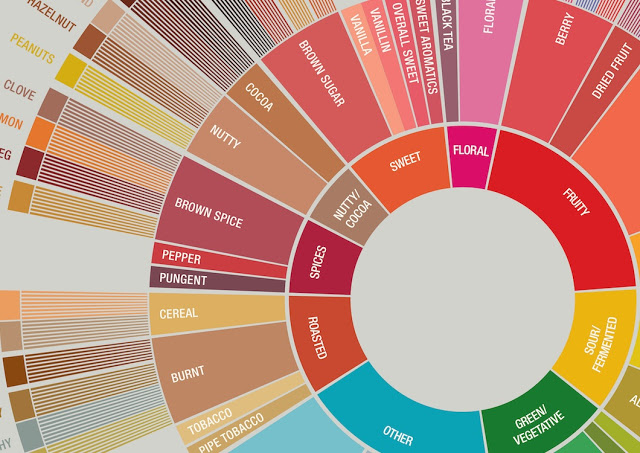
Flavor Wheel, 2016 edition
Some clues can also be seen in the new flavor wheel of SCAA in 2016. The old version is also divided into two parts: sweet, sour, bitter and salty taste (Tastes) and aroma (Aromas), while the new version only talks about flavor, taste has become a subsidiary item, and smell accounts for the vast majority.
Comparing the two versions, I think the old version of the taste description mixes the sense of smell into it, some adjectives are really unfathomable (such as salt- sharp- rough), there is a great sense of frustration after reading, and the new version is more specific. (according to SCAA, there is a lot less slang.)
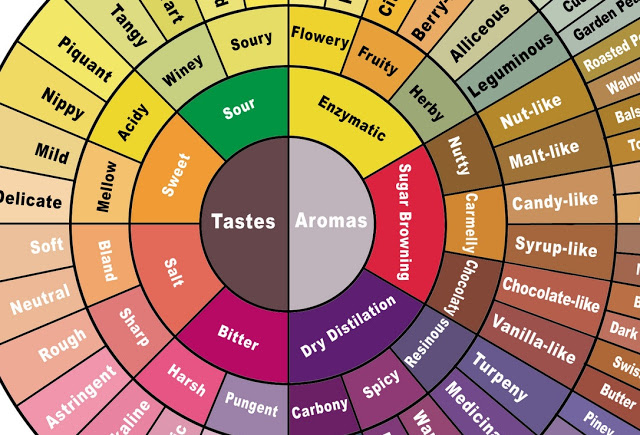
Flavor Wheel, 1995 edtion
Regarding the view of coffee sugar content, the article "Sugars in roasted coffee- a conversation" by James Hoffmann, the champion of the 2007 World Barista Competition, can see a wonderful discussion.
Read the coffee program of Taguchi, p. 113 & # 39; the truth of the sweetness of coffee & # 39, there is also such a discussion, the left evidence of the above view.
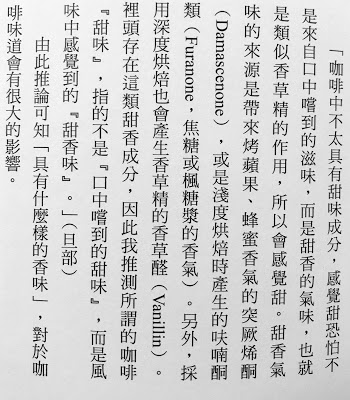
I recall that after drinking Mantenin, I always liked to smell the smell of Mori Yong milk sugar at the bottom of the cup. At that time, I always wondered, how could I not find the sweetness of milk sugar? Or want to bake the beans deeper, thinking that the caramel reaction will make the coffee sweeter, but it will only bring more bitterness. I was puzzled at that time, but now I finally understand the reason.
So is the coffee sweet? it's not sweet at all, but we can taste the beauty of the coffee through the coordination of the taste of the tongue and the smell of the nose, the sweet and mellow flavor, in the mouth, at the bottom of the cup, on the filter paper washed by hands, in the heart.
When you drink coffee, you not only have to rinse your mouth first, but you may also have to clear your nose.
Finally, you take an excerpt from the picture and see the mistakes in it.
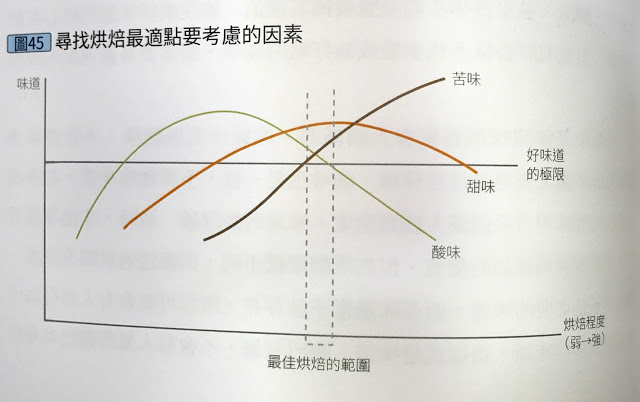
The science of coffee flavor
Important Notice :
前街咖啡 FrontStreet Coffee has moved to new addredd:
FrontStreet Coffee Address: 315,Donghua East Road,GuangZhou
Tel:020 38364473
- Prev

Why is drinking coffee addictive? how to control and reduce coffee addiction?
Communication of professional baristas Please follow the coffee workshop (Wechat official account cafe_style) if not doing coffee is essential in people's daily life, who become anxious and have no coffee, it is not simply because I like drinking coffee, but also because I have the possibility of dependence. Today I will introduce coffee addiction and withdrawal symptoms. About coffee addiction is to stop any line.
- Next

What happens when you drink too much coffee? The silent effects of caffeine on our bodies and minds
Professional barista communication Please pay attention to coffee workshop (Weixin Official Accounts cafe_style) We will introduce various symptoms caused by excessive intake of caffeine such as coffee and tea, and the impact of caffeine addiction on the spirit. About Caffeine Addiction Caffeine addiction is poisoning caused by caffeine. Caffeine has a mild stimulating effect on heart function and is said to be consumed in high amounts.
Related
- Beginners will see the "Coffee pull flower" guide!
- What is the difference between ice blog purified milk and ordinary milk coffee?
- Why is the Philippines the largest producer of crops in Liberia?
- For coffee extraction, should the fine powder be retained?
- How does extracted espresso fill pressed powder? How much strength does it take to press the powder?
- How to make jasmine cold extract coffee? Is the jasmine + latte good?
- Will this little toy really make the coffee taste better? How does Lily Drip affect coffee extraction?
- Will the action of slapping the filter cup also affect coffee extraction?
- What's the difference between powder-to-water ratio and powder-to-liquid ratio?
- What is the Ethiopian local species? What does it have to do with Heirloom native species?

